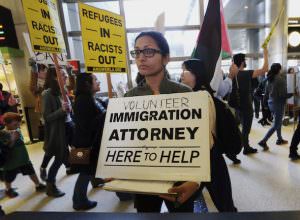Muslim NSA Targets Named in Snowden Leaks Speak About Surveillance
A spreadsheet leaked by NSA whistle-blower Edward Snowden enabled Glenn Greenwald's The Intercept to reveal the identities of five prominent Muslim Americans who were spied on by the National Security Agency, chiefly, it appears, for their political work and religious affiliation. Greenwald comments in an interview with "Democracy Now!"
A spreadsheet leaked by NSA whistle-blower Edward Snowden enabled Glenn Greenwald’s The Intercept to reveal the identities of five prominent Muslim Americans who were spied on by the National Security Agency, chiefly, it appears, for their political work and religious affiliation. Greenwald comments in an interview with “Democracy Now!”
“Democracy Now!” reportsThursday:
[The Intercept] cites an NSA spreadsheet leaked by Edward Snowden that shows nearly 7,500 email addresses monitored between 2002 and 2008, including addresses that appear to belong to foreigners the government suspects of ties to al-Qaeda, along with Americans accused of terrorist activity. But it also lists the email addresses of a former Republican operative and one-time political candidate, a professor at Rutgers University, and the head of the largest Muslim civil rights group in the country. We speak with Pulitzer Prize-winning reporter Glenn Greenwald, who broke the story for The Intercept based on documents leaked by Snowden. “The only thing they really had in common is that they are all politically active Americans Muslims,” Greenwald says. “And that seems to be enough in the intelligence community to render these people suspicious.” We are also joined by two people Greenwald names in the article: Asim Ghafoor, a prominent civil rights attorney who has represented clients in terrorism-related cases; and Faisal Gill, an attorney and former senior policy director with the Department of Homeland Security [boldface added]. When asked what needs to be done in response to the revelations, Gill argues Congress should step in and exercise its authority over how the FISA courts approve surveillance. “In our cases I don’t think there is probable cause … so the entire system needs to be examined,” Gill says. “What happens is you paint somebody with a broad brush and they’re tainted for life … Nobody wants a lawyer that the government suspects of being involved in these type of activities.”
‘Democracy Now!’:
— Adapted from “Democracy Now!” by Alexander Reed Kelly. Your support matters…Independent journalism is under threat and overshadowed by heavily funded mainstream media.
You can help level the playing field. Become a member.
Your tax-deductible contribution keeps us digging beneath the headlines to give you thought-provoking, investigative reporting and analysis that unearths what's really happening- without compromise.
Give today to support our courageous, independent journalists.






You need to be a supporter to comment.
There are currently no responses to this article.
Be the first to respond.